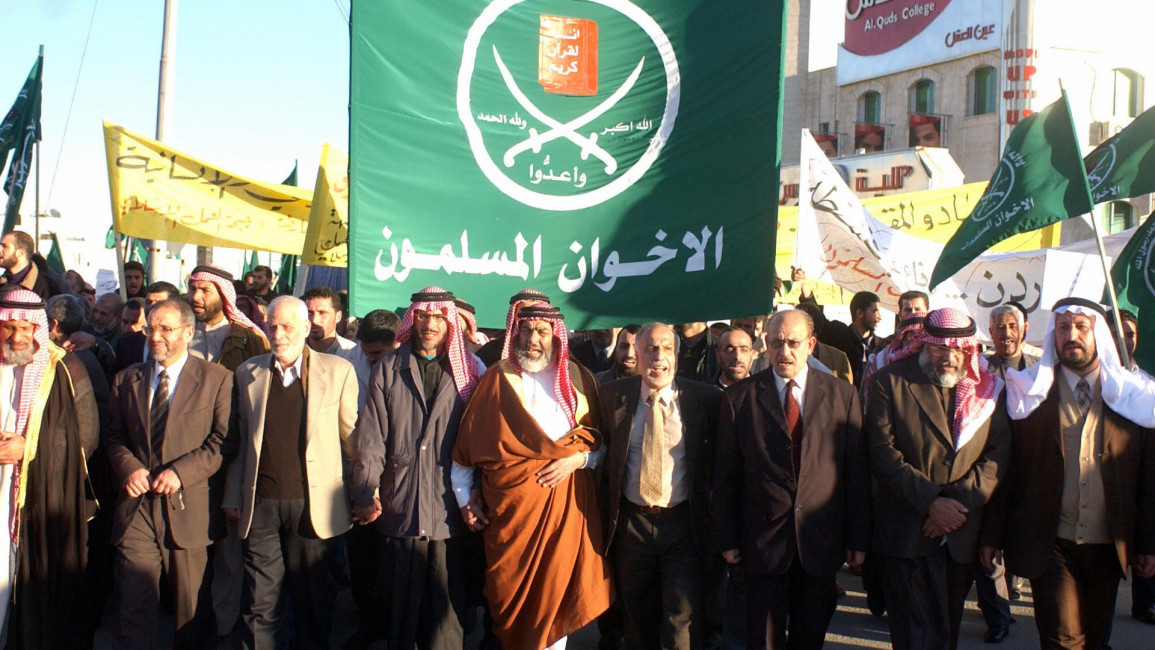
Understanding the Saudi, Emirati religious authorities' 'excommunication' of the Muslim Brotherhood
Although Saudi Arabia designated the Muslim Brotherhood a terrorist organisation in March 2014, the Saudi Council of Senior Scholars last week reiterated their stance toward the Brotherhood. On Monday, an Emirati religious body, the UAE Fatwa Council, followed suit.
On the Saudi council's Twitter page, Grand Mufti Sheikh Abdulaziz bin Abdullah al-Sheikh stated "The Muslim Brotherhood does not have any link to Islam. It is a stray group." Following the Tweet, the council issued a more formal statement claiming that the Brotherhood "is a terrorist group that does not represent the method of Islam," further maintaining that it is "calling for rebellion against the rulers, wreaking havoc in the states, destabilizing co-existence in the country."
The Emirati Council echoed this view in similarly worded rulings.
The timing of these statements seem odd, given that the Muslim Brotherhood has largely faded to the background, at least in Saudi Arabia, as have most independent political actors, since Mohammed bin Salman became crown prince in 2017.
The arrest in September 2017 of dozens of clerics linked to the Sahwa movement, which has some ties to and views in common with the Brotherhood, further incentivised silence in the face of an increasingly authoritarian leadership.
Elsewhere in the region, the Brotherhood has been similarly quiet, outlawed in neighbouring UAE and in Egypt, which is home of the mother organization. Where it is active, the Muslim Brotherhood has a limited number of seats in legislative bodies and provides social services to members, a far cry from Saudi claims that it is "calling for rebellion."
The Egyptian Muslim Brotherhood has responded to the Saudi clerics' latest statements, with spokesperson Talat Fehmi telling Anadolu Agency that "the Brotherhood is not terrorist but an inviting and reformist organisation." The Brotherhood has reiterated much the same message since 2014, when Saudi Arabia and the UAE dubbed it a terrorist group.
 |
The Brotherhood disavowed violence in 1969, its stance most clearly articulated in General Guide Hassan al-Hudaybi's book Preachers Not Judges. |  |
The Brotherhood disavowed violence in 1969, its stance most clearly articulated in General Guide Hassan al-Hudaybi's book Preachers Not Judges. Nonetheless, some members, most notably Sayyid Qutb, did go on to promote the use of violence to further common goals of the Islamisation of society, leading to the belief that, as articulated by the Emirati leadership foreign minister, the Muslim Brotherhood is "a gateway drug to violent jihadism."
Still, the Muslim Brotherhood has gone to great lengths for decades to ensure its commitment to nonviolence, which has in turned spurred criticism of it by jihadist groups, and by Al-Qaeda leader Ayman al-Zawahiri in particular, who consider the organisation too gradualist in its methods of working through existing political systems rather than seeking to dismantle them.
The Brotherhood and the GCC
As I have written elsewhere, treatment of the Muslim Brotherhood in the states of the Gulf Cooperation Council (GCC), both in terms of domestic and foreign policies, seems to vary depending on the extent to which the organisation is considered linked to a broader political opposition and therefore present a viable political threat.
|
Indeed, in Saudi Arabia and the UAE, where the Brotherhood has formally been designated as a terrorist organisation, its members had played a part in calls for reform in 2011.
In Bahrain, however, the Sunni Muslim Brotherhood has helped shore up support for the Sunni monarchy ruling the Shii majority and so has been allowed to continue participating in parliamentary elections. In Qatar, where the Muslim Brotherhood chose to dismantle itself in 1999 after conducting largely social work, the authorities never felt threatened by the group and therefore have never sought to restrict it.
The Muslim Brotherhood is also considered particularly difficult for wealthy rentier states of the GCC to manage since it cannot simply be bought off like other opposition movements. Designating it a terrorist organisation is therefore the best way to undermine criticisms that stem from the fact that the modernisation of the GCC states has been accompanied by Westernisation and secularisation – something which remains contested by segments of citizen populations in these states.
Interestingly, the Israeli Foreign Ministry's Arabic Twitter account praised the most recent Saudi statement as standing "against exploitation of religion for incitement and sedition" and recognising the need for "tolerance and mutual cooperation in the region." This reaction is particularly important, since the axis of Egypt, Saudi Arabia, the UAE, and the Trump Administration has fallen apart with a Biden presidency unlikely to entertain policies like a terrorist designation of the Muslim Brotherhood in the United States.
By focusing on anti-extremism and by carefully defining extremists as those who have proven themselves politically problematic at home, Saudi Arabia is able to justify coming closer to Israel – an arrangement that the Biden Administration would laud, while continuing to signal that domestic religious opposition will not be tolerated.
Dr Courtney Freer is a research fellow at LSE Middle East Centre.
Follow her on Twitter: @CourtneyFreer
Have questions or comments? Email us at: editorial-english@alaraby.co.uk
Opinions expressed in this article remain those of the author and do not necessarily represent those of The New Arab, its editorial board or staff.


![President Pezeshkian has denounced Israel's attacks on Lebanon [Getty]](/sites/default/files/styles/image_684x385/public/2173482924.jpeg?h=a5f2f23a&itok=q3evVtko)



 Follow the Middle East's top stories in English at The New Arab on Google News
Follow the Middle East's top stories in English at The New Arab on Google News


